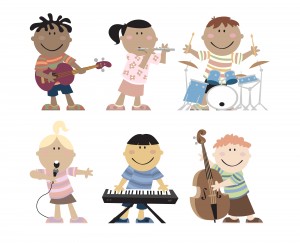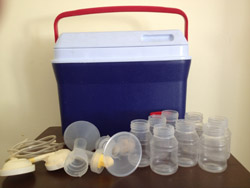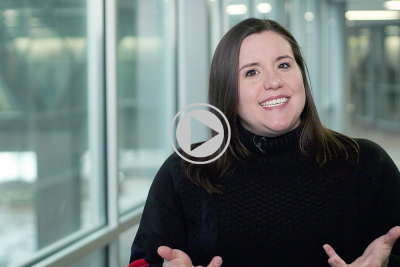Our neighbors probably think that we are little wacky. My husband and I often sing songs (ranging for the Beatles to Frozen to  completely made-up nonsense) at the top of our lungs, only to have our two sons join in the noise-making. The boys will laugh, squeal, “sing” along, dance, and drum on any object within reach. We think it’s great fun, but did you know that music can help with childhood development as well?
completely made-up nonsense) at the top of our lungs, only to have our two sons join in the noise-making. The boys will laugh, squeal, “sing” along, dance, and drum on any object within reach. We think it’s great fun, but did you know that music can help with childhood development as well?
The Journal of Neuroscience published an article in September 2014 showing a link between musical training and improved cognitive skills. Researchers at Northwestern University studied children involved in the Harmony Project (a non-profit organization that provides music education to at-risk youths in Los Angeles) and found that children who completed 2 years of music training had improved “neural processing” of speech and language.
In October 2014, the America Academy of Pediatrics announced a new collaborative effort called “Too Small to Fail,” aimed at closing the “word gap” in America. Ann O’Leary, vice president and director of the initiative explains, “The word gap refers to the disparity in words that children hear and learn from birth to age 4. Children from higher-income families hear up to 30 million more words than children from lower-income families where talking, reading and singing is not as prevalent.”
Here are some other ways that music may be beneficial to your child:
1. Music is used around the world to soothe children and lull them to sleep. It can be a great source of familiarity and comfort.
2. Music can encourage small children to get up and move and dance – a fun way to increase physical activity
3. Music can help with vocabulary and memorization skills. Most songs (especially kids’ songs) have repetitive lyrics, which are easy to learn.
4. Music can be a social activity. Learning to make music together can encourage teamwork and cooperative play.
5. Music fosters creativity.
6. Music (especially learning a new instrument) can teach concentration, focus, and discipline.
7. Music can become a way to express feelings and independence.
There are many ways to incorporate music into your child’s day.
1. The easiest way is to sing to them or play age-appropriate music. You don’t even have to be a good singer – kids don’t mind if you are off pitch!
2. Make your own musical instruments using household items and start your own band. Pots and pans with wooden spoons are a favorite with toddlers. Make a “trumpet” with an empty paper towel roll. Make a “xylophone” with glasses filled with different amounts of water. Make “shakers” with dried beans in a tightly sealed plastic container. Or make a “guitar” using an empty shoe box and some large rubber bands.
3. Have a “dance party.” Pick a different genre of music each time and dress up for the occasion. You could even have theme appropriate snacks to top it off.
4. Some communities have formal music enrichment programs for children – even infants.
5. Sign kids up for music lessons. Most schools have some sort of music education program and may even have after school activities. Encourage your child to join the choir, band, or orchestra. Plato famously said, “Music gives a soul to the universe, wings to the mind, flight to the imagination, and life to everything.” How do you share the gift of music with your children?





Comments